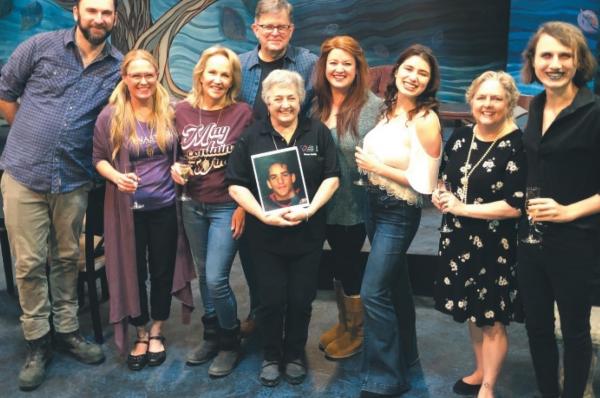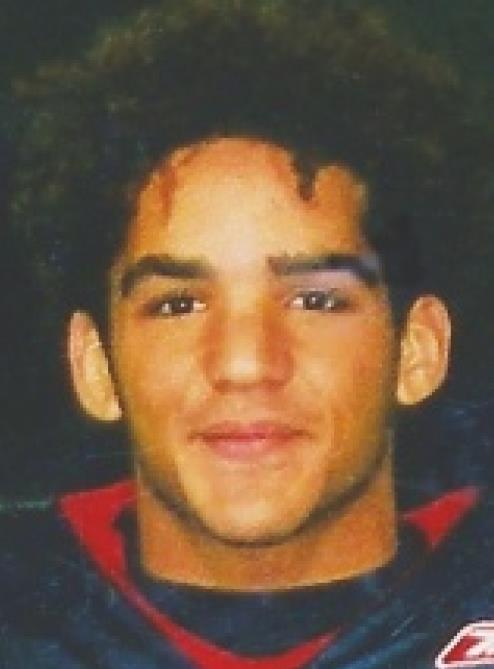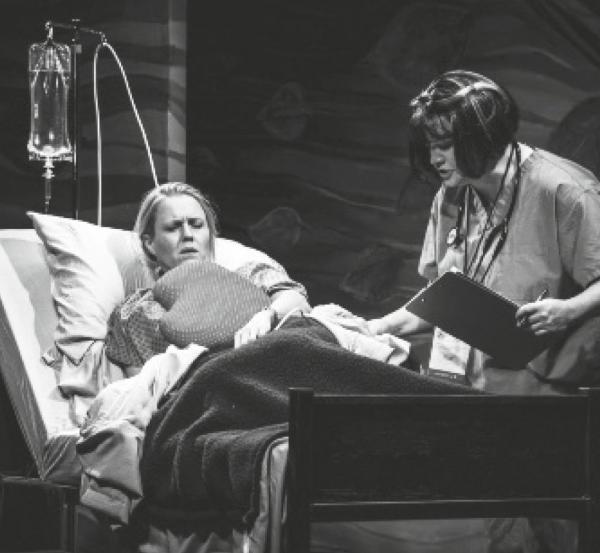THE STORY OF SAVING LIVES with organ donation
“The Tin Woman,” which is currently on stage at the Wimberley Playhouse, opens with a woman in a hospital bed clutching a heart-shaped pillow to her chest. She has just received a donated heart.
Shift to stage left, the family of the heart donor is sitting on a cold park bench dealing with the sudden loss of their son. The mother is strong and pragmatic and wants to move on. The father is angry and in denial.
The play is based on a true story.
Local residents Carmen and Paul Polhemus have lived that story. Carmen and Paul’s son, 19-year-old Daniel, who grew up in Wimberley, was killed in a single-car traffic accident in 2005. Daniel’s kidneys, liver and pancreas were donated. Earlier, another son of Carmen and Paul had received a tissue transplant, a heart valve.
For the last 15 years, Carmen and Paul have devoted their energies to spreading the word about organ donation.
When the Wimberley Players settled on “The Tin Woman,” they contacted Texas Organ Sharing Alliance (TOSA) in Austin to get a speaker — someone who could bring the play’s message home in a very real way. The Alliance called Carmen to come and speak on opening night.
It was an emotional time for all. The box of tissues in the playhouse lobby was well used as people exited the theater. The play has its humorous moments, but in the end many a tear was shed.
For Carmen, the experience was personal. Always friendly, outgoing and upbeat, Carmen delivered her opening remarks on organ donation without a hitch. But after watching the play, she had a tough time getting through her closing comments. “I was supposed to do the closing remarks and I thought to myself, I don’t think I can do this. I did regret I was not able to say more after the play,” says Carmen. “That night I was just a mom.”
She adds: “I was extremely proud of the Wimberley Players for bringing up such a sensitive topic.”
That night in the lobby, Carmen, along with an official from TOSA, signed up some 20 new organ donors.
Close to home
“There were several things (in the play) that were right on,” says Carmen. “The recipient’s ambivalence is very real. They are aware that someone died so that they could live.”
In “The Tin Woman,” the lady who got the heart, Joy, meets the family of Jack who was killed in an auto accident. At first, the meeting is rocky with many awkward moments. Jack’s mother and sister are welcoming and accepting. Jack’s father is against the idea from the get-go.
Although Carmen and Paul received “thank you” letters from the recipients of Daniel’s organs, they chose not to meet them personally. “It was all too fresh. I could probably do it now (meet the recipients), but I did not want to do it at the time,” says Paul.
There’s a scene in the play where the family goes through Jack’s belongings, deciding what to keep and what to give away. Do his shirts go? Does his camera stay? “That’s one scene from the donor family’s standpoint that is so true,” says Carmen. “They are going through a box of his belongings. That’s the hardest part. Well, maybe not the hardest part. It’s all hard.”
The suddenness of the whole process makes it difficult for people to sort through their emotions.
From the point of view of the recipient: “They spend all this time fighting day by day. They live with their suitcases packed and ready to go for when they get that phone call. And then they find out they have another 20 or 30 years to live,” explains Carmen.
From the point of view of the donors: “The donor families don’t plan on being donor families. You’re not ready when a deputy arrives at your door. The guilt the father showed (in the play) was an extreme example,” she adds.
“I don’t want to seem sexist,” says Carmen, “but moms react totally different from dads. And siblings’ feelings can never be ignored. The scene where she (Jack’s sister) was teaching her class about flowers and she dissolved into tears was very realistic.”
Over the years, Carmen and Paul have spoken with many donors and recipients and have come to realize there’s no “normal” reaction.
“I have not met anyone personally who was in that same situation (as the family in the play). The donor family network is close — I don’t need to know all the details. We just have to respect each other’s losses,” say Carmen.
Saying goodbye
Carmen and Paul’s son grew up in Wimberley and played sports here before heading to Austin to start the next phase of his life and prepare for college. Daniel was on life-support for a week, following his accident. That’s where the family got to say goodbye and prepare for his organ donations.
“Conditions have to be just right,” says Carmen, for organs to be harvested. The organs begin to deteriorate quickly. That’s why someone on life support is the perfect candidate for a donation. There’s time to prepare.
Daniel’s kidney’s and liver went to individuals and his pancreas was donated to a pilot program at the University of California, Los Angeles where one of his cells would be injected into someone suffering from diabetes. The injection wouldn’t actually cure the disease, but it would make insulin injections unnecessary. “We don’t know how many people Daniel helped,” says Paul.
Daniel’s heart was damaged in the accident and unsuitable for transplant.
“I am so grateful that Daniel was a donor. We didn’t lose him. There are people out there like Joy (the recipient in the play) who are living because of Daniel,” says Carmen.
“The Tin Woman” winds up its run at the Wimberley Playhouse this weekend, with shows Friday and Saturday evenings and a Sunday matinee. For tickets go to www.wimberleyplayers. org or call the box office at 512-847-1575.
The playhouse is located at 450 Old Kyle Road.
To find out more about organ donation, contact the Texas Organ Sharing Alliance at www.tosai.org or call 866-685-0277.
Organ-sharing facts
— More than 115,000 people are on the national waiting list, including 10,000 in Texas.
— More than 20 people in the waiting list die every day.
— More than 11 million Texans have signed up to donate organs.
— There are no age restrictions for donors.
— Organs are only taken after all medical options are exhausted.
— Of the 2.3 million people who die in the U.S. every year, less than two percent are eligible to be organ donors.
— Almost everyone can be a tissue donor (bones, licaments, skin, corneas, etc.)
Source: Texas Organ Sharing Alliance




